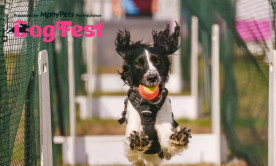Lots of dog owners treat their pets with presents, snacks, and maybe even their own turkey meal at Christmas. But it’s important to remember that some popular festive foods are not dog friendly and can make pets very sick. Some traditional Christmas foods can even be poisonous. Other things like decorations and popular seasonal plants can also be dangerous.
Dog owners should already know some of the information covered in this article, like not giving dogs chocolate, but Christmas exposes dog’s to lots of guests who might not know what’s harmful. It’s important to let them know what’s safe and what’s poisonous.
Below we offer tips and advice on how to keep your dog safe and happy through the festive period.
Harmful and poisonous Christmas food for dogs
Chocolate
Chocolate contains theobromine which is very toxic for dogs. The amount of chocolate a dog can eat before it is fatal depends on the size of the dog.
All types of chocolate are dangerous for dogs to eat (like milk, dark, and cooking) but some contain less theobromine than others. Symptoms of chocolate poisoning in dogs include vomiting, diarrhea, hyperactivity, tremors, seizures, and even death.
Onions, garlic, leeks and chives (allium food groups)
Vegetables in the allium food group contain thiosulfate, which is toxic to dogs. These foods can cause damage to red blood cells, leading to anemia. Symptoms of allium poisoning include vomiting, diarrhea, weakness, and pale gums.
Remember that gravy and seasonings can contain traces of these foods and shouldn’t be fed to dogs.
Grapes and raisins
These are poisonous to dogs and can cause kidney failure. Symptoms of grape or raisin poisoning include vomiting, diarrhea, abdominal pain, and weakness.
Alcohol
It should go without warning that you should never give alcohol to dogs. Even a small amount of alcohol can make them very ill and can even be deadly.
Macadamia nuts and some other nut types
Dogs love peanut butter, but it’s very important to remember that not all nuts are okay for dogs. Nuts that are dangerous include macadamia, almonds, walnuts and hazelnuts.
Full list of nuts which are safe and unsafe for dogs (external website link)
Christmas pudding and mince pies
These contain raisins which are toxic for dogs. Some recipes include alcohol which is also dangerous.
Stuffing
Stuffing can contain a wide range of ingredients that are poisonous to dogs. Common Christmas stuffing recipes include onions, garlic, chives, and leeks. Even stuffing without harmful ingredients can also cause your dog to have an upset stomach.
Sweets, including sugar free treats
Xylitol is often used as a sugar-free sweetener in sweets, candy and other sweet foods. Xylitol is very toxic to dogs and can be deadly. Symptoms of xylitol poisoning include vomiting, diarrhoea, weakness, seizures, and coma.
Cooked bones
Some may think giving a dog the bones from the turkey is an obvious treat, but cooked bones are a lot less durable than raw bones. Cooked bones can easily splinter and can become lodged in your dog’s throat and intestines.
Christmas plants
Many people decorate their homes with plants at Christmas or like to give them as gifts. However, traditional plants like holly and mistletoe, and the festive looking Poinsettia, can be very poisonous to dogs if they eat them.
Popular Christmas plants which are toxic to dogs include:
- Poinsettia
- Holly
- Mistletoe (including the berries)
- Amaryllis
- Lilies
For a full list of plants poisonous to dogs, see Blue Cross’s extensive list here (external website link)
Symptoms of plant poisoning in dogs include:
- vomiting
- diarrhoea
- abdominal pain
- drooling
- tremors
- seizures
Decorations and general safety tips
- Secure the Christmas tree: it’s always a good idea to secure your Christmas tree to the wall or ceiling to prevent it from falling over if your dog knocks it.
- Real trees: if you have a real Christmas tree, vacuum up loose needles regularly. Needles can be painful if they get stuck in your dog's paws or digestive system.
- Presents under the tree: it’s not a good idea to keep presents unoccupied under the tree if they contain foods poisonous to dogs (like a box of chocolates). Even the most disciplined of dogs can misbehave sometimes and open gifts not meant for them.
- Wrapping paper and ribbons: keep things like wrapping paper, ribbons, bows, and Sellotape out of reach of dogs as they can be a choking hazard and cause problems with their digestive system.
- Fairy lights and electrical cords: hide electrical cords from the Christmas tree and fairy lights to prevent your dog from chewing on them.
Your dog’s mental wellbeing
Christmas can be a hectic time for dogs with lots of new people coming and going into their home. This can be overwhelming for some dogs. Make sure your dog has a quiet place of their own, where they can go to feel safe and relaxed.
Try and supervise all interactions between your dog and visitors, especially children. And remind people who are not used to dogs about what is poisonous for them. It’s always a good rule not to let anyone else feed anything to your dog without your permission.
Stick to your dog's regular routine and walking schedule as much as possible, even on Christmas Day. This will help to reduce stress and anxiety. And remember to give your dog plenty of exercise and mental stimulation.
If you’re worried your dog is becoming stressed, read our brief guide: Signs and relief for dog stress.





